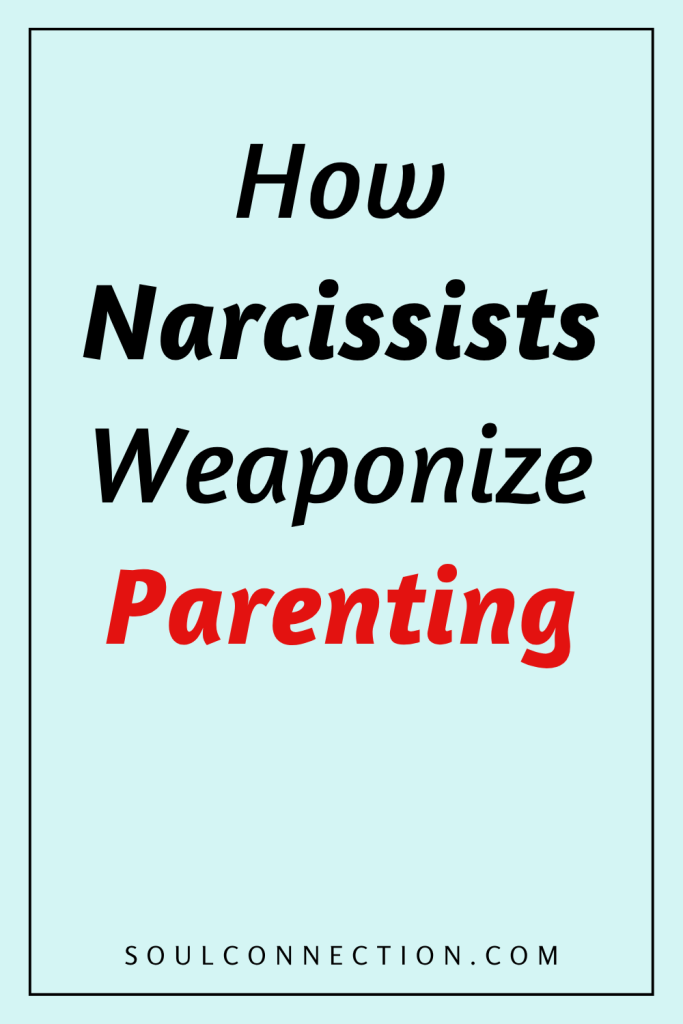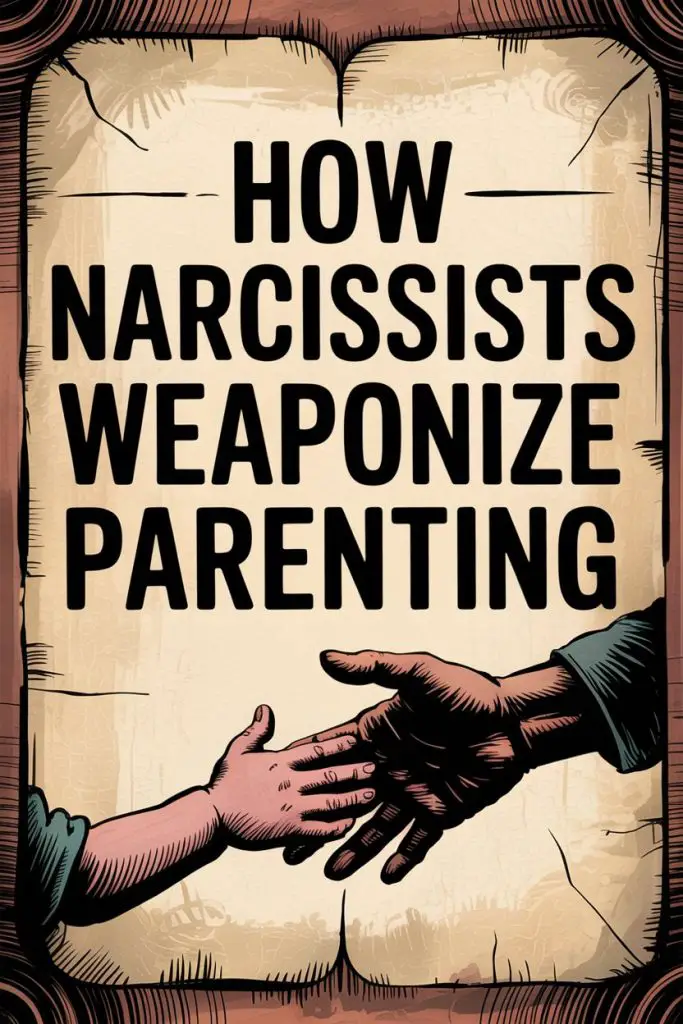Parenting is tough enough when you’re not being held emotionally hostage by a narcissist.
But when the person on the other side of the playpen sees your child as an extension of their ego—or worse, a pawn—things go from “pass the wet wipes” to “pass the therapist’s number” in record time.
Narcissists have a knack for turning anything into a tool for self-advancement. Parenting, unfortunately, is their favorite Swiss Army knife.
If you’ve found yourself side-eyeing your co-parent’s “parenting techniques” and wondering if you’re the only one spotting the manipulation, you’re not.
Grab a cup of tea (or something stronger). It’s time to get honest about how narcissists weaponize parenting—and what you can actually do about it tonight.
Turning Kids Into Mini-Mes
One of the narcissist’s opening moves? Crafting a child in their own image, not out of love, but out of a desperate need for validation.
Their child isn’t an individual—they’re a walking, talking mirror for the narcissist’s ego.
The soccer star? That’s not little Jamie’s love for the game; it’s Dad’s fantasy of his own lost glory days. The piano prodigy? That’s Mom’s personal symphony, not the kid’s.
Children of narcissists often wind up feeling invisible unless they’re reflecting their parent’s dreams, opinions, or mood. Next time you hear, “Our child LOVES ballet—just like I did,” check if the child’s face matches the enthusiasm.
Using Love as Currency
Most parents’ love is the “no returns, no receipts, infinite refills” variety. With a narcissist, love comes with strings. Big, thick, trip-you-up strings.
Affection, praise, even basic attention, all become conditional rewards for toeing the narcissist’s line.
Did the child perform well—and make the parent look good? Cue the applause. Did the child assert their independence? Suddenly, the well runs dry.
Kids learn to perform, not because it feels good, but because it’s the only way to get a drop of warmth. This isn’t love—it’s emotional economics.
Playing Parents Against Each Other
Ever heard, “But Mum lets me!” or “Dad says you’re too strict”? Standard fare in most households. Narcissists, though, elevate this to an Olympic sport.
The narcissist’s goal isn’t co-parenting harmony. It’s maintaining power—by pitting parents (and sometimes, stepparents) against each other.
They’ll paint themselves as the “fun” or “generous” parent, while their ex is recast as the villain.
Expect a masterclass in manipulation: secret texts, whispered promises, and the occasional crocodile tear. The aim isn’t the child’s wellbeing. It’s keeping everyone off balance, especially the adult who refuses to play by their rules.
Gaslighting Through the Kids
When narcissists don’t get the reaction they want from you, they may use the children as little messengers—or, more accurately, as unwitting grenades.
You’ll hear things like, “Daddy says you’re always angry,” or, “Mum told me you don’t care about me.” These aren’t innocent remarks.
They’re a form of gaslighting, designed to distort your reality and make you question your own sanity.
Children can end up parroting stories or attitudes that clearly originated elsewhere. When reality starts to bend and you’re left feeling like you’re in a funhouse mirror maze, you’ve witnessed narcissistic gaslighting at its finest.
Boundary Bulldozing
Boundaries? Those are just suggestions to a narcissist.
If you’ve ever tried to set consistent rules—bedtimes, screen time, the sacred “no dessert before dinner” decree—prepare for sabotage. The narcissist will undermine these boundaries, often in full view of the kids.
This isn’t forgetfulness. It’s a calculated move to erode your authority and send the message: rules only matter when they benefit the narcissist.
Kids, of course, get confused and anxious wondering which parent’s word counts.
Making the Child the Emotional Caretaker
Narcissists don’t just want attention, they want adoration. Who better to supply it than a child who hasn’t yet learned that “my feelings are not my parent’s job”?
Children end up comforting, praising, or “taking care of” the narcissist’s emotional needs. Maybe they’re asked to pick sides in adult arguments. Maybe they’re guilted for wanting time with the other parent.
This is called parentification, and it’s about as healthy as a diet made entirely of sugar cubes.
Triangulation and Divide and Conquer
Another crowd favorite: getting other people involved. The narcissist will recruit siblings, grandparents, teachers, and family friends into their web.
Everyone gets their own version of reality—always starring the narcissist as the misunderstood hero.
Kids who are old enough to notice may find themselves caught in a loyalty tug-of-war, forced to choose which adult to believe. Younger ones just learn that trust is a minefield.
Withholding or Overloading Information
Narcissists keep control by deciding what information gets shared—and when.
Maybe they hide important school updates from the other parent. Or they flood the child with inappropriate adult details (“Your father is late with support because he loves his new wife more than you”).
Either way, the goal is power, not clarity.
Kids are left anxious and confused, burdened with knowledge or starved of answers.
Smear Campaigns and Scapegoating
If the narcissist feels slighted or threatened, the smear campaign begins. The child may be told outright lies about the other parent, or made to feel responsible for every problem in the house.
One child might be the Golden Child—showered with praise, used to show off. The other becomes the Scapegoat—blamed, shamed, and ignored. Neither role is safe or healthy.
Turning Victimhood Into an Art Form
Narcissists love to play the victim—especially if it means getting the child on “their side.”
Suddenly, every disagreement is reframed as a personal attack. “Poor Dad, Mum is always mean to him.” The child is expected to offer comfort, attention, and—most importantly—allegiance.
This keeps the narcissist at the center of attention. It also ensures the child grows up thinking love means caretaking, not partnership.
Sabotaging Holidays and Milestones
Special occasions provide the perfect stage for maximum drama.
Birthdays, graduations, even school plays—all become opportunities for power plays. The narcissist may “forget” to show up, arrive fashionably late, or create a scene.
Bonus points if they can ruin the other parent’s mood in the process.
Children soon learn to associate big moments with tension, not celebration.
What Can You Actually Do?
Parenting with a narcissist is like football with moving goalposts—while wearing a blindfold.
Yet even the slipperiest tactics can be countered with the right moves:
- Stick to your boundaries. Announce them calmly, enforce them consistently, and don’t waste time explaining yourself to the narcissist. The kids will learn who means what they say.
- Validate your child’s feelings. When they parrot confusing or hurtful things, remind them that all feelings are okay, but not every story they hear is the truth.
- Keep communication boring and businesslike. No reason to provide an emotional buffet for the narcissist to feast on.
- Document, document, document. If legal action is ever needed, having a written record helps.
- Find your own support squad. The narcissist will try to isolate you. Trusted friends, therapists, and support groups can keep you steady.
- Encourage your child’s independence. Give them choices, support their interests, and let them know their voice matters—even if the other parent tries to drown it out.
Raising Resilient Kids—Even With a Narcissist in the Mix
No one signs up for the “co-parenting with a narcissist” Olympics. If you’re reading this and nodding, you’re not alone—and you’re not powerless.
Children are remarkably resilient—especially when one adult in their life stays grounded, steady, and determined to break the cycle.
Every time you show them what healthy love looks like, you’re giving them something the narcissist never could: the freedom to be themselves.
And if that means throwing out the narcissist’s rulebook and teaching your child to write their own? Cheers to that.


